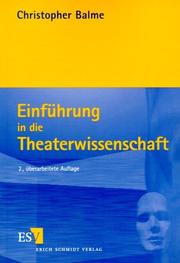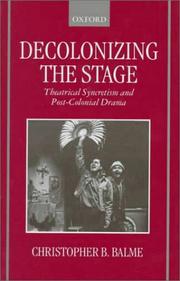| Listing 1 - 10 of 29 | << page >> |
Sort by
|
Multi
ISBN: 9781107006836 110700683X 9781139051668 1316638871 1316010120 1139989499 113998487X 1316005623 1316007863 1316003361 1139051660 1316012360 1316001121 Year: 2014 Publisher: Cambridge: Cambridge university press,
Abstract | Keywords | Export | Availability | Bookmark
 Loading...
Loading...Choose an application
- Reference Manager
- EndNote
- RefWorks (Direct export to RefWorks)
The concept of the public sphere, as first outlined by German philosopher Jürgen Habermas, refers to the right of all citizens to engage in debate on public issues on equal terms. In this book, Christopher Balme explores theatre's role in this crucial political and social function. He traces its origins and argues that the theatrical public sphere invariably focuses attention on theatre as an institution between the shifting borders of the private and public, reasoned debate and agonistic intervention. Chapters explore this concept in a variety of contexts, including the debates that led to the closure of English theatres in 1642; theatre's use of media; controversies surrounding race, religion and blasphemy; and theatre's place in a new age of globalized aesthetics. Balme concludes by addressing the relationship of theatre today with the public sphere and whether theatre's transformation into an art form has made it increasingly irrelevant for contemporary society.
Theatrical science --- Sociology of culture --- Theater and society. --- Theater audiences --- Théâtre et société --- Théâtre --- Publics --- Theater. --- Öffentlichkeit. --- Communication --- Aspect social --- Théâtre et société --- Théâtre --- Aspect social. --- Theater and society --- Actors --- Society and theater --- Theater --- Social status --- Social aspects

ISBN: 3503049843 9783503049844 Year: 2001 Publisher: Berlin: Schmidt,
Abstract | Keywords | Export | Availability | Bookmark
 Loading...
Loading...Choose an application
- Reference Manager
- EndNote
- RefWorks (Direct export to RefWorks)
Multi
ISBN: 9780521672238 9780521856225 0521672236 0521856221 9780511817021 131626243X 1316260801 0511817029 Year: 2008 Publisher: Cambridge ; New York : Cambridge University Press,
Abstract | Keywords | Export | Availability | Bookmark
 Loading...
Loading...Choose an application
- Reference Manager
- EndNote
- RefWorks (Direct export to RefWorks)
Providing thorough coverage of the methods and tools required in studying historical and contemporary theatre, this introduction examines the complexities of a rapidly changing and dynamic discipline. Following a cross-cultural perspective, the book surveys the ways theatre and performance are studied by looking initially at key elements such as performers, spectators and space. The central focus is on methodology, which is divided into sections covering theatre theory, historiography and textual and performance analysis. The book covers all the main theatrical genres – drama, opera and dance – providing students with a comparative, integrated perspective. Designed to guide students through the academic dimension of the discipline, the volume emphasizes questions of methodology, research techniques and approaches, and will therefore be relevant for a wide variety of theatre studies courses. Informative textboxes provide background on key topics, and suggestions for further reading are included at the end of each chapter. • Covers all main theatrical genres: drama, opera and dance, providing a comparative and integrated perspective • Takes account of different theatrical practices in a variety of international, cultural and historical contexts • Emphasizes questions of methodology, research techniques and approaches, therefore relating to a wide variety of different theatre studies courses.
Theatrical science --- Theater. --- Théâtre --- Theater --- Théâtre --- Dramatics --- Histrionics --- Professional theater --- Stage --- Theatre --- Performing arts --- Acting --- Actors --- Histoire et critique

ISBN: 0198184441 0191674265 9780198184447 Year: 1999 Publisher: Oxford: Clarendon,
Abstract | Keywords | Export | Availability | Bookmark
 Loading...
Loading...Choose an application
- Reference Manager
- EndNote
- RefWorks (Direct export to RefWorks)
Decolonizing the Stage is a major study devoted to post-colonial drama and theatre. It examines the way dramatists and directors from various countries and societies have attempted to fuse the performance idioms of their indigenous traditions with the Western dramatic form. These experiments are termed 'syncretic theatre'. The study provides a theoretically sophisticated, cross-cultural comparative approach to a wide number of writers, regions, and theatre movements, ranging from Maori, Aboriginal, and native American theatre to Township theatre in South Africa. Writers studied include Nobel Prize-winning authors such as Wole Soyinka, Derek Walcott, and Rabindranath Tagore, along with others such as Ngugi wa Thiong'o, Jack Davis, Girish Karnad, and Tomson Highway. Decolonizing the Stage demonstrates how the dynamics of syncretic theatrical texts function in performance. It combines cultural semiotics with performance analysis to provide an important contribution to the growing field of post-colonial drama and intercultural performance.
Drama --- Theater --- Decolonization in literature --- Théâtre (Genre littéraire) --- Théâtre --- Décolonisation dans la littérature --- History and criticism. --- Developing countries --- Histoire et critique --- Pays en développement --- Literature and society --- Postcolonialism in literature --- History and criticism --- Postcolonialism in literature. --- Developing countries. --- Théâtre (Genre littéraire) --- Théâtre --- Décolonisation dans la littérature --- Pays en développement --- Drama - History and criticism --- Theater - Developing countries --- Literature and society - Developing countries --- DRAMA --- THEATRE --- TAGORE (RABINDRANATH) --- DAVIS (JACK) --- KARNAD (GIRISH) --- HIGHWAY (TOMSON) --- NGUGI WA THIONG'O, 1938 --- -SOYINKA (WOLE), 1934 --- -WALCOTT (DEREK), 1930 --- -HISTORY AND CRITICISM --- DEVELOPING COUNTRIES
Book
ISBN: 1108861180 1108768253 1108487890 9781108487894 110885785X Year: 2020 Publisher: Cambridge: Cambridge university press,
Abstract | Keywords | Export | Availability | Bookmark
 Loading...
Loading...Choose an application
- Reference Manager
- EndNote
- RefWorks (Direct export to RefWorks)
When the Anglo-American theatre manager and actor, Maurice E. Bandmann, died of enteric fever at the Colonial Hospital in Gibraltar on 9 March 1922 shortly before his fiftieth birthday, the event was reported across the English-speaking world from Madras to Singapore, and from Cairo to Hong Kong, with many newspapers carrying lengthy obituaries: The Times of India called him 'the pioneer of musical comedy in this part of the world' having 'brought to the East some forty or fifty companies. The Straits Times in Singapore claimed that 'he inaugurated the system that will remain as a monument to his memory in theatrical circles. The Era, London's theatrical trade paper, emphasized 'the fine plays and well-equipped companies he presented (which) became famous in all parts of the world, many stars appearing under his management, and the Bandman Opera Company, with all the latest musical comedy successes, was exceedingly popular everywhere in the East. As these statements indicate, Maurice Bandmann was at the time considered a key figure in what will be called in this book, the globalization of theatre. For over two decades, Bandmann was a household name in the theatre world of the time, a guarantor of quality itinerant theatrical entertainment, especially of musical comedy performed by the legendary Bandmann Opera Company. The Bandmann Circuit, as it was known, extended from Gibraltar to Tokyo and included more than two dozen towns and cities, across the Asian continent as well as occasional forays across to the West Indies and even South America. In terms of sheer reach and territory covered, Bandmann was a global theatrical entrepreneur, who, while certainly concentrating on English-speaking settlements also performed regularly in Japan to Japanese audiences, before Chinese in Shanghai and Peking and numerous cities where audiences were linguistically mixed
Theatrical managers --- Actors --- Traveling theater --- Theater and globalization. --- Actor-network theory. --- ANT (Sociological theory) --- Sociology --- Globalization and theater --- Globalization --- Stage actors --- Theater actors --- Theatrical actors --- Artists --- Entertainers --- Theater --- Traveling theatrical companies --- Theatrical companies --- Managers, Theatrical --- Theater managers --- Theater management --- History. --- Social networks. --- Methodology --- Bandmann, Maurice E. --- Theatrical managers - United States - Biography --- Actors - United States - Biography --- Traveling theater - History --- Theater and globalization --- Actors - Social networks
Book
ISBN: 9783484660137 3484660139 3110935139 Year: 1995 Publisher: Tübingen: Max Niemeyer,
Abstract | Keywords | Export | Availability | Bookmark
 Loading...
Loading...Choose an application
- Reference Manager
- EndNote
- RefWorks (Direct export to RefWorks)
Theater --- Intercultural communication --- Syncrétisme --- Théâtre --- Anthropologie --- Danse --- Rituels
Book
ISBN: 9783503098248 Year: 2008 Publisher: Berlin : Schmidt,
Abstract | Keywords | Export | Availability | Bookmark
 Loading...
Loading...Choose an application
- Reference Manager
- EndNote
- RefWorks (Direct export to RefWorks)
Book
ISBN: 1003196330 1003196330 1032051582 Year: 2023 Publisher: Routledge
Abstract | Keywords | Export | Availability | Bookmark
 Loading...
Loading...Choose an application
- Reference Manager
- EndNote
- RefWorks (Direct export to RefWorks)
"This volume explores how the Cultural Cold War played out in Africa and Asia in the context of decolonization. Both the USA and the Soviet Union as well as East European states undertook significant efforts to influence cultural life in the newly independent, postcolonial world. The different forms of influence are the subject of this book. The contributions are grouped around four topic headings. "Networks and Institutions" looks at the various ways Western-style theatre became institutionalized in the decolonial world, especially Africa. "Cultural Diplomacy" focuses on the activities of the Soviet Union in India in the late 1950s and 1960s in the very different arenas of book publishing and the circus. "Artists and Agency" explores how West African filmmakers (Ousmane Sembene and Abderrahmane Sissako) and European authors (Brecht and Ibsen) were harnessed for different kinds of Cold War strategies. Finally, the section "Cultures of Things" investigates how everyday objects such as books and iconic theatre buildings became suffused with affect, nostalgia and ideology. This book will be of interest for students of the Cold War, postcolonial studies, theatre, film and literature"-- Provided by publisher.
Politics and literature --- Theater --- Cultural diplomacy --- Cold War. --- Decolonization --- History --- Political aspects --- History --- History --- Developing countries --- Developing countries --- Civilization. --- Foreign relations.
Book
ISBN: 3503049371 9783503049370 Year: 1999 Publisher: Berlin Schmidt
Abstract | Keywords | Export | Availability | Bookmark
 Loading...
Loading...Choose an application
- Reference Manager
- EndNote
- RefWorks (Direct export to RefWorks)
Drama --- Theater --- Theaterwetenschap. --- Theaterwissenschaft. --- Théâtre (Genre littéraire) --- Théâtre --- History and criticism. --- History. --- Histoire et critique. --- Histoire. --- Théorie --- Analyse théâtrale --- Histoire
Multi
ISBN: 9781108768252 9781108487894 9781108738200 Year: 2020 Publisher: Cambridge Cambridge University Press
Abstract | Keywords | Export | Availability | Bookmark
 Loading...
Loading...Choose an application
- Reference Manager
- EndNote
- RefWorks (Direct export to RefWorks)
Theatrical science --- Film: persons --- United States of America
| Listing 1 - 10 of 29 | << page >> |
Sort by
|

 Search
Search Feedback
Feedback About UniCat
About UniCat  Help
Help News
News